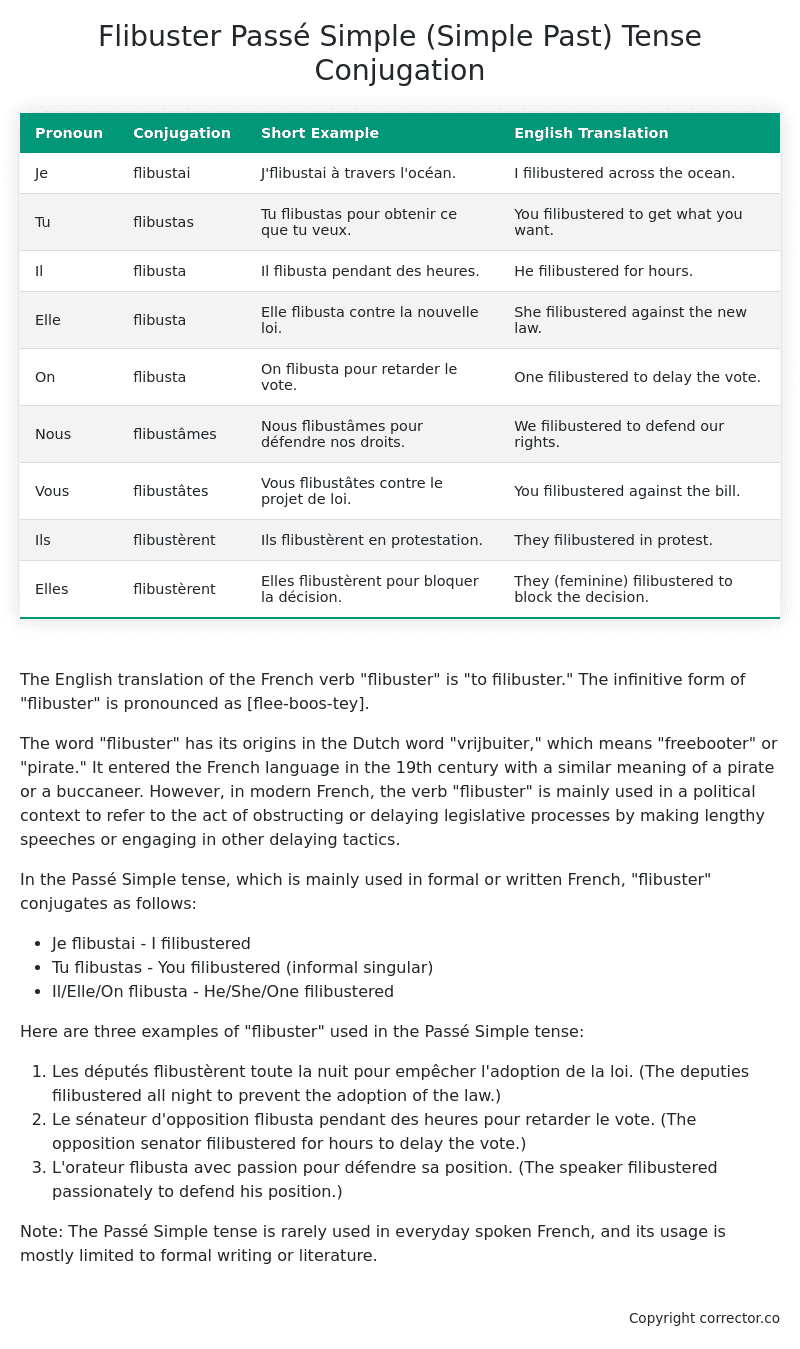Passé Simple (Simple Past) Tense Conjugation of the French Verb flibuster
Introduction to the verb flibuster
The English translation of the French verb “flibuster” is “to filibuster.” The infinitive form of “flibuster” is pronounced as [flee-boos-tey].
The word “flibuster” has its origins in the Dutch word “vrijbuiter,” which means “freebooter” or “pirate.” It entered the French language in the 19th century with a similar meaning of a pirate or a buccaneer. However, in modern French, the verb “flibuster” is mainly used in a political context to refer to the act of obstructing or delaying legislative processes by making lengthy speeches or engaging in other delaying tactics.
In the Passé Simple tense, which is mainly used in formal or written French, “flibuster” conjugates as follows:
- Je flibustai – I filibustered
- Tu flibustas – You filibustered (informal singular)
- Il/Elle/On flibusta – He/She/One filibustered
Here are three examples of “flibuster” used in the Passé Simple tense:
- Les députés flibustèrent toute la nuit pour empêcher l’adoption de la loi. (The deputies filibustered all night to prevent the adoption of the law.)
- Le sénateur d’opposition flibusta pendant des heures pour retarder le vote. (The opposition senator filibustered for hours to delay the vote.)
- L’orateur flibusta avec passion pour défendre sa position. (The speaker filibustered passionately to defend his position.)
Note: The Passé Simple tense is rarely used in everyday spoken French, and its usage is mostly limited to formal writing or literature.
Table of the Passé Simple (Simple Past) Tense Conjugation of flibuster
| Pronoun | Conjugation | Short Example | English Translation |
|---|---|---|---|
| Je | flibustai | J’flibustai à travers l’océan. | I filibustered across the ocean. |
| Tu | flibustas | Tu flibustas pour obtenir ce que tu veux. | You filibustered to get what you want. |
| Il | flibusta | Il flibusta pendant des heures. | He filibustered for hours. |
| Elle | flibusta | Elle flibusta contre la nouvelle loi. | She filibustered against the new law. |
| On | flibusta | On flibusta pour retarder le vote. | One filibustered to delay the vote. |
| Nous | flibustâmes | Nous flibustâmes pour défendre nos droits. | We filibustered to defend our rights. |
| Vous | flibustâtes | Vous flibustâtes contre le projet de loi. | You filibustered against the bill. |
| Ils | flibustèrent | Ils flibustèrent en protestation. | They filibustered in protest. |
| Elles | flibustèrent | Elles flibustèrent pour bloquer la décision. | They (feminine) filibustered to block the decision. |
Other Conjugations for Flibuster.
Le Present (Present Tense) Conjugation of the French Verb flibuster
Imparfait (Imperfect) Tense Conjugation of the French Verb flibuster
Passé Simple (Simple Past) Tense Conjugation of the French Verb flibuster (You’re reading it right now!)
Passé Composé (Present Perfect) Tense Conjugation of the French Verb flibuster
Futur Simple (Simple Future) Tense Conjugation of the French Verb flibuster
Futur Proche (Near Future) Tense Conjugation of the French Verb flibuster
Plus-que-parfait (Pluperfect) Tense Conjugation of the French Verb flibuster
Passé Antérieur (Past Anterior) Tense Conjugation of the French Verb flibuster
Futur Antérieur (Future Anterior) Tense Conjugation of the French Verb flibuster
Subjonctif Présent (Subjunctive Present) Tense Conjugation of the French Verb flibuster
Subjonctif Passé (Subjunctive Past) Tense Conjugation of the French Verb flibuster
Subjonctif Imparfait (Subjunctive Imperfect) Tense Conjugation of the French Verb flibuster
Subjonctif Plus-que-parfait (Subjunctive Pluperfect) Tense Conjugation of the French Verb flibuster
Conditionnel Présent (Conditional Present) Tense Conjugation of the French Verb flibuster
Conditionnel Passé (Conditional Past) Tense Conjugation of the French Verb flibuster
Conditionnel Passé II (Conditional Past II) Tense Conjugation of the French Verb flibuster
L’impératif Présent (Imperative Present) Tense Conjugation of the French Verb flibuster
L’impératif Passé (Imperative Past) Tense Conjugation of the French Verb flibuster
L’infinitif Présent (Infinitive Present) Tense Conjugation of the French Verb flibuster
L’infinitif Passé (Infinitive Past) Tense Conjugation of the French Verb flibuster
Le Participe Présent (Present Participle) Tense Conjugation of the French Verb flibuster
Le Participe Passé (Past Participle) Tense Conjugation of the French Verb flibuster
Struggling with French verbs or the language in general? Why not use our free French Grammar Checker – no registration required!
Get a FREE Download Study Sheet of this Conjugation 🔥
Simply right click the image below, click “save image” and get your free reference for the flibuster Passé Simple tense conjugation!

Flibuster – About the French Passé Simple (Simple Past) Tense
Formation
Usage
Narration
Historical Context
Interactions with other tenses
Passé Composé
Imparfait
Conditional and Subjunctive
Summary
I hope you enjoyed this article on the verb flibuster. Still in a learning mood? Check out another TOTALLY random French verb conjugation!


